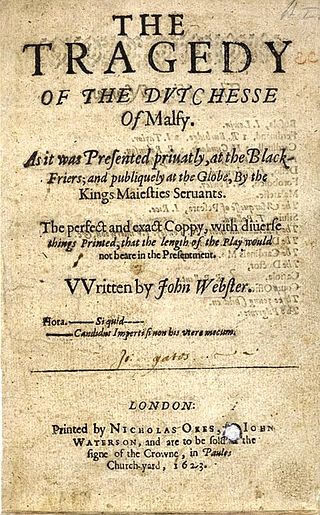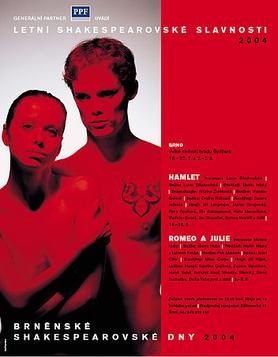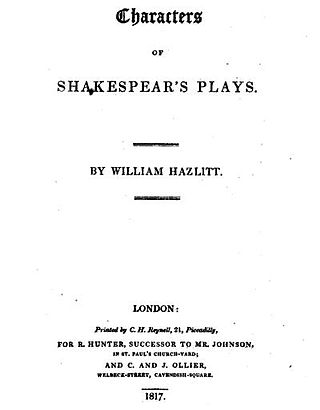The malcontent is a character type that often appeared in early modern drama. The character, usually an unhappy outsider, but always dissatisfied, observes and comments on the action, and is sometimes metafictionally aware that they are in a play.
The malcontent is a character type that often appeared in early modern drama. The character, usually an unhappy outsider, but always dissatisfied, observes and comments on the action, and is sometimes metafictionally aware that they are in a play.
The character is discontented with the social structure and other characters in the play, and is often an outsider who observes and comments on the action, and may even acknowledge they are in a play. Shakespeare's Richard III, Iago in Othello , and Jaques in As You Like It are typical malcontents.
The role is usually both political and dramatic, with the malcontent voicing dissatisfaction with the usually Machiavellian political atmosphere and often using asides to build up a kind of self-consciousness and awareness of the text itself that other characters in the play lack. [1]
Important malcontents include Bosola in Webster's The Duchess of Malfi , Vindice in Middleton's The Revenger's Tragedy , Malevole in Marston's The Malcontent , and Hamlet in Shakespeare's Hamlet .
The morality and sympathy of the malcontent is highly variable, as in the examples above. Sometimes, as in Hamlet and The Malcontent, they are the sympathetic centre of the play, whereas Iago is a very unsympathetic character. The most important thing about the malcontent is that the character is malcontent—unhappy, unsettled, displeased with the world of the play, eager to change it somehow, or to dispute with it. [2]
The malcontent is an objective or quasi-objective voice that comments on the play's concerns as though somehow above or beyond them.[ citation needed ] The concept has much to do with the Renaissance idea of humorism and a surfeit of "black bile" which caused melancholy. [3]
There is an ontological argument regarding Iago: if a malcontent is dissatisfied due to a displacement from their place in the social order, then Iago does not fit. His scheming and disaffection is not clearly motivated by resentment stemming from an injustice done to him. [4]

Othello is a tragedy written by William Shakespeare, around 1603. The story revolves around two characters, Othello and Iago.

Shakespearean tragedy is the designation given to most tragedies written by playwright William Shakespeare. Many of his history plays share the qualifiers of a Shakespearean tragedy, but because they are based on real figures throughout the history of England, they were classified as "histories" in the First Folio. The Roman tragedies—Julius Caesar, Antony and Cleopatra and Coriolanus—are also based on historical figures, but because their sources were foreign and ancient, they are almost always classified as tragedies rather than histories. Shakespeare's romances were written late in his career and published originally as either tragedy or comedy. They share some elements of tragedy, insofar as they feature a high-status central character, but they end happily like Shakespearean comedies. Almost three centuries after Shakespeare's death, the scholar F. S. Boas also coined a fifth category, the "problem play," for plays that do not fit neatly into a single classification because of their subject matter, setting, or ending. Scholars continue to disagree on how to categorize some Shakespearean plays.

Richard Burbage was an English stage actor, widely considered to have been one of the most famous actors of the Globe Theatre and of his time. In addition to being a stage actor, he was also a theatre owner, entrepreneur, and painter. He was the younger brother of Cuthbert Burbage. They were both actors in drama. Burbage was a business associate and friend to William Shakespeare.

Robert Armin was an English actor, and member of the Lord Chamberlain's Men. He became the leading comedy actor with the troupe associated with William Shakespeare following the departure of Will Kempe around 1600. Also a popular comic author, he wrote a comedy, The History of the Two Maids of More-clacke, as well as Foole upon Foole, A Nest of Ninnies (1608) and The Italian Taylor and his Boy.
John Webster was an English Jacobean dramatist best known for his tragedies The White Devil and The Duchess of Malfi, which are often seen as masterpieces of the early 17th-century English stage. His life and career overlapped with Shakespeare's.
Comic relief is the inclusion of a humorous character, scene, or witty dialogue in an otherwise serious or dramatic work, often to relieve tension.

John Marston was an English playwright, poet and satirist during the late Elizabethan and early Jacobean periods. His career as a writer lasted only a decade. His work is remembered for its energetic and often obscure style, its contributions to the development of a distinctively Jacobean style in poetry, and its idiosyncratic vocabulary.
Revenge tragedy is a theatrical genre, in which the principal theme is revenge and revenge's fatal consequences. Formally established by American educator Ashley H. Thorndike in his 1902 article "The Relations of Hamlet to Contemporary Revenge Plays," a revenge tragedy documents the progress of the protagonist's revenge plot and often leads to the demise of both the murderers and the avenger himself.

The Duchess of Malfi is a Jacobean revenge tragedy written by English dramatist John Webster in 1612–1613. It was first performed privately at the Blackfriars Theatre, then later to a larger audience at The Globe, in 1613–1614.

Othello is a 1965 film based on the National Theatre Company's staging of Shakespeare's Othello (1964-1966) staged by John Dexter. Directed by Stuart Burge, the film stars Laurence Olivier, Maggie Smith, Joyce Redman, and Frank Finlay, who all received Oscar nominations, and provided film debuts for both Derek Jacobi and Michael Gambon.

John Lowin was an English actor.

Iago is a fictional character who appears in Walt Disney Pictures' animated film Aladdin (1992), the direct-to-video sequels The Return of Jafar (1994), Aladdin and the King of Thieves (1996), and the television series. An anthropomorphic red-plumed talking parrot, he was voiced by Gilbert Gottfried in all animated appearances until his death in 2022. He was subsequently voiced by Alan Tudyk in the live-action adaptation of Aladdin, by Barrett Leddy in the 2023 Disney+ special Lego Disney Princess: The Castle Quest, and Piotr Michael in the 2023 crossover short Once Upon a Studio.
The Shakespeare Theatre Company is a regional theatre company located in Washington, D.C. The theatre company focuses primarily on plays from the Shakespeare canon, but its seasons include works by other classic playwrights such as Euripides, Ibsen, Wilde, Shaw, Schiller, Coward and Tennessee Williams. The company manages and performs in two spaces: The Michael R. Klein Theatre and Sidney Harman Hall. In cooperation with George Washington University, they run the STC Academy.

The Summer Shakespeare Festival takes place in the courtyard of Burgrave Palace at Prague Castle. The festival was originally initiated by Václav Havel. The performances are also presented at Špilberk in Brno and at Bratislava Castle in Bratislava. The organizers closely cooperate with Martin Hilský, who translated most of the staged plays.

The Malcontent is an early Jacobean stage play written by the dramatist and satirist John Marston ca. 1603. The play was one of Marston's most successful works. It is widely regarded as one of the most significant plays of the English Renaissance; an extensive body of scholarly research and critical commentary has accumulated around it.

Othello is a character in Shakespeare's Othello. The character's origin is traced to the tale "Un Capitano Moro" in Gli Hecatommithi by Giovanni Battista Giraldi Cinthio. There, he is simply referred to as the Moor.

Characters of Shakespear's Plays is an 1817 book of criticism of Shakespeare's plays, written by early nineteenth century English essayist and literary critic William Hazlitt. Composed in reaction to the neoclassical approach to Shakespeare's plays typified by Samuel Johnson, it was among the first English-language studies of Shakespeare's plays to follow the manner of German critic August Wilhelm Schlegel, and, with the work of Samuel Taylor Coleridge, paved the way for the increased appreciation of Shakespeare's genius that was characteristic of later nineteenth-century criticism. It was also the first book to cover all of Shakespeare's plays, intended as a guide for the general reader.

Chukwudi Iwuji is a Nigerian and British actor known for his recent collaborations with James Gunn. He is an Associate Artist for the Royal Shakespeare Company. He began his career in mainstream Hollywood in 2022 as Clemson Murn / Ik Nobe Lok in the HBO Max show Peacemaker. He also joined the Marvel Cinematic Universe in Guardians of the Galaxy Vol. 3 as The High Evolutionary, for which he received critical praise.
Frank W. Wadsworth was an American Shakespearean scholar, author, and sportsman.
Iago is a major character in William Shakespeare's 1607 play Othello. His role is one of Othello's outwardly loyal courtier and friend, who in fact hates him and schemes his downfall. He also manipulates his friends and master into doing his bidding, eventually persuading Othello to believe that his wife, Desdemona, has been having an affair, resulting in Othello killing her in a jealous rage.